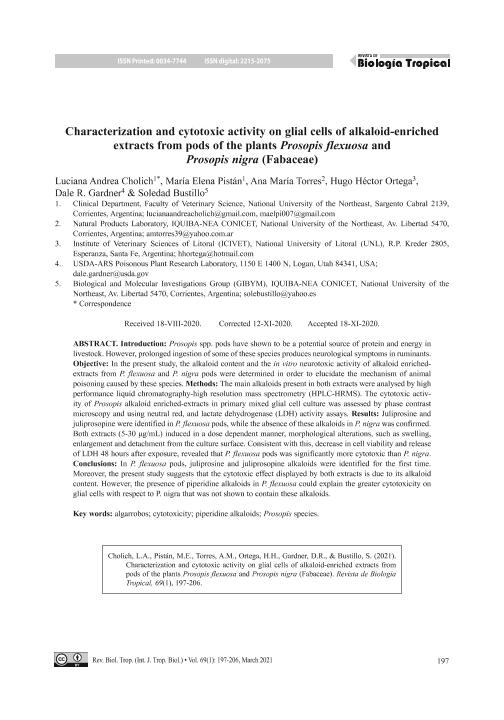Mostrar el registro sencillo del ítem
dc.contributor.author
Cholich, Luciana Andrea

dc.contributor.author
Pistan, Maria Elena

dc.contributor.author
Torres, Ana Maria

dc.contributor.author
Ortega, Hugo Hector

dc.contributor.author
Gardner, Dale R.
dc.contributor.author
Bustillo, Soledad

dc.date.available
2021-09-16T12:00:52Z
dc.date.issued
2020-10
dc.identifier.citation
Cholich, Luciana Andrea; Pistan, Maria Elena; Torres, Ana Maria; Ortega, Hugo Hector; Gardner, Dale R.; et al.; Characterization and cytotoxic activity on glial cells of alkaloid-enriched extracts from pods of the plants prosopis flexuosa and prosopis Nigra (Fabaceae); Revista de Biología Tropical; Revista de Biología Tropical; 69; 1; 10-2020; 197-206
dc.identifier.issn
0034-7744
dc.identifier.uri
http://hdl.handle.net/11336/140486
dc.description.abstract
Introduction: Prosopis spp. pods have shown to be a potential source of protein and energy in livestock. However, prolonged ingestion of some of these species produces neurological symptoms in ruminants. Objective: In the present study, the alkaloid content and the in vitro neurotoxic activity of alkaloid enriched-extracts from P. flexuosa and P. nigra pods were determined in order to elucidate the mechanism of animal poisoning caused by these species. Methods: The main alkaloids present in both extracts were analysed by high performance liquid chromatography-high resolution mass spectrometry (HPLC-HRMS). The cytotoxic activity of Prosopis alkaloid enriched-extracts in primary mixed glial cell culture was assessed by phase contrast microscopy and using neutral red, and lactate dehydrogenase (LDH) activity assays. Results: Juliprosine and juliprosopine were identified in P. flexuosa pods, while the absence of these alkaloids in P. nigra was confirmed. Both extracts (5-30 μg/mL) induced in a dose dependent manner, morphological alterations, such as swelling, enlargement and detachment from the culture surface. Consistent with this, decrease in cell viability and release of LDH 48 hours after exposure, revealed that P. flexuosa pods was significantly more cytotoxic than P. nigra. Conclusions: In P. flexuosa pods, juliprosine and juliprosopine alkaloids were identified for the first time. Moreover, the present study suggests that the cytotoxic effect displayed by both extracts is due to its alkaloid content. However, the presence of piperidine alkaloids in P. flexuosa could explain the greater cytotoxicity on glial cells with respect to P. nigra that was not shown to contain these alkaloids.
dc.format
application/pdf
dc.language.iso
spa
dc.publisher
Revista de Biología Tropical

dc.rights
info:eu-repo/semantics/openAccess
dc.rights.uri
https://creativecommons.org/licenses/by-nc-sa/2.5/ar/
dc.subject
ALGARROBOS
dc.subject
CYTOTOXICITY
dc.subject
PIPERIDINE ALKALOIDS
dc.subject
PROSOPIS SPECIES
dc.subject.classification
Ciencias Veterinarias

dc.subject.classification
Ciencias Veterinarias

dc.subject.classification
CIENCIAS AGRÍCOLAS

dc.title
Characterization and cytotoxic activity on glial cells of alkaloid-enriched extracts from pods of the plants prosopis flexuosa and prosopis Nigra (Fabaceae)
dc.type
info:eu-repo/semantics/article
dc.type
info:ar-repo/semantics/artículo
dc.type
info:eu-repo/semantics/publishedVersion
dc.date.updated
2021-07-30T18:52:57Z
dc.identifier.eissn
2215-2075
dc.journal.volume
69
dc.journal.number
1
dc.journal.pagination
197-206
dc.journal.pais
Costa Rica

dc.journal.ciudad
Turrialba
dc.description.fil
Fil: Cholich, Luciana Andrea. Consejo Nacional de Investigaciones Científicas y Técnicas. Centro Científico Tecnológico Conicet - Nordeste; Argentina. Universidad Nacional del Nordeste. Facultad de Ciencias Veterinarias; Argentina
dc.description.fil
Fil: Pistan, Maria Elena. Consejo Nacional de Investigaciones Científicas y Técnicas. Centro Científico Tecnológico Conicet - Nordeste; Argentina. Universidad Nacional del Nordeste. Facultad de Ciencias Veterinarias; Argentina
dc.description.fil
Fil: Torres, Ana Maria. Consejo Nacional de Investigaciones Científicas y Técnicas. Centro Científico Tecnológico Conicet - Nordeste. Instituto de Química Básica y Aplicada del Nordeste Argentino. Universidad Nacional del Nordeste. Facultad de Ciencias Exactas Naturales y Agrimensura. Instituto de Química Básica y Aplicada del Nordeste Argentino; Argentina
dc.description.fil
Fil: Ortega, Hugo Hector. Consejo Nacional de Investigaciones Científicas y Técnicas. Centro Científico Tecnológico Conicet - Santa Fe. Instituto de Ciencias Veterinarias del Litoral. Universidad Nacional del Litoral. Facultad de Ciencias Veterinarias. Instituto de Ciencias Veterinarias del Litoral; Argentina
dc.description.fil
Fil: Gardner, Dale R.. No especifíca;
dc.description.fil
Fil: Bustillo, Soledad. Consejo Nacional de Investigaciones Científicas y Técnicas. Centro Científico Tecnológico Conicet - Nordeste. Instituto de Química Básica y Aplicada del Nordeste Argentino. Universidad Nacional del Nordeste. Facultad de Ciencias Exactas Naturales y Agrimensura. Instituto de Química Básica y Aplicada del Nordeste Argentino; Argentina
dc.journal.title
Revista de Biología Tropical

dc.relation.alternativeid
info:eu-repo/semantics/altIdentifier/url/https://revistas.ucr.ac.cr/index.php/rbt/article/view/43515
dc.relation.alternativeid
info:eu-repo/semantics/altIdentifier/doi/http://dx.doi.org/10.15517/rbt.v69i1.43515
Archivos asociados
